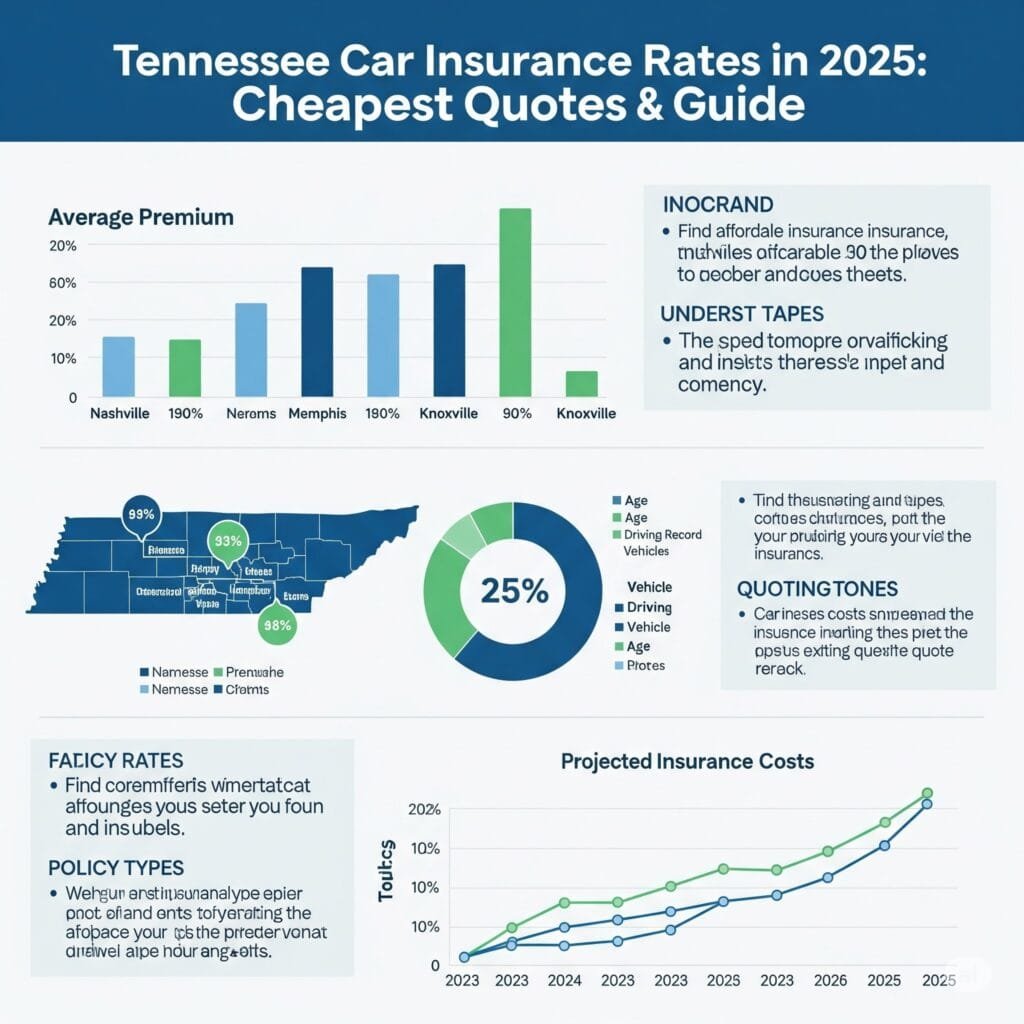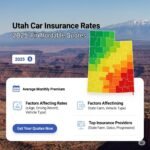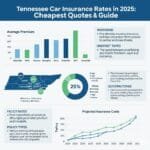Are you a Tennessee driver wondering if you’re paying too much for car insurance? With the average cost for full coverage hitting $1,991 per year, it’s a question every Tennessean should be asking. That’s nearly $166 out of your pocket every month, and if you’re a young driver or have a mark on your record, that number could be significantly higher.
What you pay for your policy isn’t just a random number. It’s a carefully calculated rate based on where you live in the Volunteer State—from the bustling streets of Memphis to the quiet roads of Bristol—as well as your age, your driving history, and even the type of car you own. The difference between a good rate and a great rate could mean saving hundreds, or even thousands, of dollars each year.
Imagine having the clarity and confidence to know you’re not overpaying. This guide is designed to give you just that. We will break down every key factor that shapes your Tennessee car insurance rates. You’ll discover how much your neighbors might be paying, why your rates could be high, and most importantly, uncover powerful, actionable strategies to lower your monthly premium.
Let’s put you back in the driver’s seat of your finances. Read on to become an expert on car insurance costs in Tennessee and learn how to secure the most affordable Tennessee car insurance quote for your unique needs.
The Big Picture: What Is the Average Cost of Car Insurance in Tennessee?
When shopping for car insurance, one of the first questions you’ll ask is, “How much should I expect to pay?” In Tennessee, the average cost for full coverage is $1,991 per year (or $166 per month), while minimum coverage costs an average of $504 per year (or $42 per month).
Compared to the national average, Tennessee drivers benefit from relatively affordable rates. The national average for full coverage is typically higher, so Tennesseans often save on their insurance premiums. However, remember that these averages are just a starting point—your individual rate will depend on various factors unique to your situation.
What Do “Full Coverage” and “Minimum Coverage” Mean?
Understanding these two terms is the first step to getting the right policy for your budget and needs.
- Minimum Coverage: This is the bare-bones insurance required by Tennessee state law to legally drive. It only covers damages and injuries you cause to other people and their property. It does not cover repairs for your own vehicle if you cause an accident.
- Full Coverage: This isn’t an official policy type, but it’s a common term for a policy that includes liability coverage plus collision and comprehensive coverage.
- Collision Coverage: Helps pay to repair or replace your car if it’s damaged in an accident with another vehicle or object, regardless of who is at fault.
- Comprehensive Coverage: Helps pay for damage to your car from non-accident events like theft, vandalism, fire, hail, or hitting an animal.
Tennessee’s Minimum Car Insurance Requirements
To drive legally in the state of Tennessee, you must carry at least the following amounts of liability insurance:
- $25,000 for bodily injury liability per person
- $50,000 for bodily injury liability per accident
- $25,000 for property damage liability per accident
Here’s what that means in simple terms:
- If you cause an accident that injures someone, your insurance will pay up to $25,000 for one person’s medical bills.
- If multiple people are injured, your policy will pay a maximum of $50,000 for the entire accident.
- Your insurance will cover up to $25,000 in damages to the other person’s car or property.
Driving without this minimum insurance is illegal and can lead to serious penalties, including fines, suspension of your driver’s license, and the requirement to file an SR-22 form, which will make your future insurance rates much higher.
How Your Location Affects Your Tennessee Car Insurance Quote
Where you park your car at night has a surprisingly large impact on your insurance premium. Rates can vary dramatically from one city to the next. Insurers look at local factors like:
- Traffic Density: More cars on the road mean a higher chance of accidents.
- Theft and Vandalism Rates: Areas with higher crime statistics will have higher premiums.
- Weather Patterns: Regions prone to hail, tornadoes, or flooding can see higher comprehensive coverage rates.
- Repair Costs: The local cost of auto parts and labor can also influence rates.
Below is a look at the average annual full coverage premiums in some of Tennessee’s major cities, showing how they stack up against the state average.
| City | Average Annual Full Coverage Premium | Percentage Difference from State Average |
| Memphis | $2,560 | +25% |
| Nashville | $1,970 | -1% |
| Knoxville | $1,896 | -5% |
| Chattanooga | $1,906 | -4% |
| Clarksville | $1,899 | -5% |
| Murfreesboro | $1,827 | -9% |
| Franklin | $1,807 | -10% |
| Johnson City | $1,675 | -17% |
| Kingsport | $1,683 | -17% |
| Bristol | $1,647 | -19% |
As you can see, a driver in Memphis could pay over $900 more per year than a driver in Bristol for the exact same coverage. This is why it’s so important to get a Tennessee car insurance quote based on your specific ZIP code.
The Age Factor: Tennessee Car Insurance Rates by Age and Gender
Your age and experience behind the wheel are two of the most significant factors in determining your car insurance rate. In Tennessee, insurers are allowed to use both age and gender to calculate premiums. Statistically, young, inexperienced drivers are more likely to be involved in accidents, so they pay the highest rates.
Here’s a breakdown of average annual full coverage costs for male and female drivers at different life stages.
Average Annual Full Coverage Premium for Male Drivers
| Age | Average Annual Premium |
| 16 | $5,189 |
| 18 | $6,880 |
| 20 | $4,708 |
| 25 | $2,660 |
| 30 | $2,194 |
| 40 | $2,009 |
| 50 | $1,869 |
| 60 | $1,772 |
| 70 | $2,069 |
Average Annual Full Coverage Premium for Female Drivers
| Age | Average Annual Premium |
| 16 | $4,577 |
| 18 | $5,934 |
| 20 | $4,102 |
| 25 | $2,511 |
| 30 | $2,139 |
| 40 | $1,973 |
| 50 | $1,827 |
| 60 | $1,729 |
| 70 | $2,039 |
Rates for 16-year-olds are calculated on their parents’ policy. Rates for 18- and 20-year-olds are for their own policies as renters.
Special Considerations for Young Drivers in Tennessee
The high cost of insurance for teenagers can be a shock for many families. However, there is a simple and effective way to manage these costs: keeping the young driver on their parents’ policy.
A teenager or young adult getting their own separate policy is almost always significantly more expensive. By adding them to a family policy, they benefit from the parents’ driving history, credit score, and multi-policy discounts.
| Age | On Parents’ Policy | On Their Own Policy | Cost Difference |
| Age 18 | $4,054 | $6,407 | 58% more |
| Age 19 | $3,511 | $4,945 | 41% more |
| Age 20 | $3,260 | $4,405 | 35% more |
The data is clear: adding a young driver to an existing policy can save thousands of dollars per year.
Your Driving Record Matters: How Incidents Impact Rates
No single factor has a more direct impact on your car insurance rates than your driving record. Insurance companies reward safe drivers with lower premiums and penalize high-risk behaviors with steep surcharges. A clean record tells an insurer you are less likely to file a claim, making you cheaper to insure.
Here is how common driving incidents can increase the average full coverage premium in Tennessee:
| Driving Incident | Avg. Annual Premium in TN | Percentage Increase from Clean Record |
| Clean Driving Record | $1,991 | 0% |
| Speeding Ticket Conviction | $2,504 | +26% |
| At-Fault Accident | $2,878 | +45% |
| DUI Conviction | $4,447 | +123% |
A single DUI conviction can more than double your car insurance premium. In addition to the massive rate hike, you will also be required to have an SR-22 certificate filed with the state. An SR-22 is not insurance itself, but a document your insurer files to prove you have the required liability coverage. Finding an insurer willing to file an SR-22 can be challenging and often requires seeking out companies that specialize in high-risk policies.
The Role of Credit Score in Your Car Insurance Premium
In Tennessee, insurers can use a credit-based insurance score to help determine your rates. This is a different model than your standard FICO score, but it is based on similar information from your credit report. Statistically, individuals with higher credit scores tend to file fewer claims, so they are rewarded with lower insurance premiums.
Here’s how your credit tier can affect your average annual full coverage premium:
| Credit Tier | Avg. Annual Premium in TN | Percentage Change from Good Credit |
| Excellent | $1,604 | -19% |
| Good | $1,991 | 0% |
| Average | $2,291 | +15% |
| Poor | $4,342 | +118% |
Improving your credit score can be a powerful long-term strategy for lowering your car insurance costs.
What You Drive: Car Insurance Costs by Vehicle Type
The car you choose to drive is another key piece of the premium puzzle. Insurers consider several vehicle-specific factors:
- Repair Costs: Luxury and sports cars with expensive parts and specialized labor cost more to repair, and thus, more to insure.
- Theft Rate: Some popular models, like the Ford F-150, are stolen more frequently, which increases comprehensive insurance rates.
- Safety Ratings: Vehicles with excellent safety ratings and features may earn you a discount.
- Engine Power: High-performance vehicles are statistically involved in more high-speed accidents.
Here are some examples of average annual full coverage premiums for popular vehicles in Tennessee:
| Vehicle Type | Average Annual Full Coverage Premium |
| Ford F-150 | $1,939 |
| Honda Odyssey | $1,844 |
| Toyota Camry | $1,991 |
| Toyota Prius | $2,038 |
| BMW 330i | $2,571 |
Before you purchase a new or used car, it’s a great idea to get a Tennessee car insurance quote for it first. You might be surprised by how much the rate can vary between two similarly priced vehicles.
How to Get Cheaper Car Insurance Quotes in Tennessee
While many rating factors are out of your control, you have significant power to lower your car insurance premium. Finding affordable coverage is all about being a smart and proactive shopper. Here are the most effective ways to save:
- Shop Around and Compare Quotes: This is the single most important step. Don’t just accept the first quote you receive. Rates for the exact same coverage can vary by hundreds of dollars between companies. Get at least three Tennessee car insurance quotes to ensure you’re getting a competitive price.
- Ask for Every Possible Discount: Insurance companies offer a wide range of discounts. When getting a quote, make sure to ask about all the ones you might be eligible for, such as:
- Bundling Discount: Combining your auto and home or renters insurance with the same company.
- Good Student Discount: For young drivers who maintain a “B” average or better.
- Safe Driver/Telematics Program: Programs like Liberty Mutual’s RightTrack® reward you for safe driving habits.
- Pay-in-Full Discount: Paying your entire premium upfront instead of in monthly installments.
- Online Purchase Discount: Many companies offer a discount for simply getting a quote and buying your policy online.
- Safety Features Discount: For having features like anti-lock brakes, airbags, and anti-theft systems.
- Raise Your Deductible: Your deductible is the amount you pay out-of-pocket on a collision or comprehensive claim before your insurance kicks in. Choosing a higher deductible, like moving from $500 to $1,000, will lower your monthly premium. Just be sure you can comfortably afford to pay that amount if you need to file a claim.
- Improve and Maintain Your Credit Score: As shown above, a better credit score leads to significantly lower rates. Paying bills on time and keeping credit card balances low can improve your score over time and lead to long-term savings.
- Maintain a Clean Driving Record: Avoiding accidents and traffic tickets is the foundation of affordable car insurance. A clean record proves to insurers that you are a low-risk driver.
- Choose the Right Amount of Coverage: While minimum coverage is the cheapest, it offers very little protection. However, if you drive an older car with a low market value, paying for full coverage might not be cost-effective. Evaluate your car’s worth and decide if you can drop collision and comprehensive coverage to save money.
Frequently Asked Questions (FAQ)
What is the cheapest car insurance company in Tennessee?
The cheapest company is different for every driver. It depends on your unique combination of factors like your age, driving record, ZIP code, and the vehicle you drive. For example, while Travelers might be cheapest for a driver with a clean record, Progressive might offer a better rate for someone with a speeding ticket. The only way to find the cheapest company for you is to compare Tennessee car insurance quotes from multiple providers.
How Much Is Car Insurance Per Month in Tennessee?
On average, Tennessee drivers pay about $166 per month for full coverage and $42 per month for minimum coverage. Keep in mind that your personal monthly cost may vary based on factors specific to your situation.
Do I need car insurance in Tennessee?
Yes. Tennessee law requires all drivers to carry a minimum of 25/50/25 liability insurance. Driving without it can result in significant financial and legal penalties.
How can I get a Tennessee car insurance quote?
Getting a quote is easy. Most major insurance companies like Liberty Mutual, GEICO, and Progressive offer free, no-obligation quotes online or over the phone. You will need to provide some basic information, including your name, address, driver’s license number, and vehicle information (make, model, and VIN). The process typically takes only a few minutes.
Methodology
Bankrate utilizes Quadrant Information Services to analyze 2025 rates for all ZIP codes and carriers in all 50 states and Washington, D.C. Rates are based on a 40-year-old male and female driver with a clean driving record, good credit, and a 2023 Toyota Camry. Full coverage rates are based on the following limits:
- $100,000 bodily injury liability per person
- $300,000 bodily injury liability per accident
- $50,000 property damage liability per accident
- $100,000 personal injury protection
- $100,000 uninsured motorist bodily injury per person
- $300,000 uninsured motorist bodily injury per accident
- $500 collision deductible
- $500 comprehensive deductible
Your own quotes will be different. The rates shown are for comparative purposes only.





